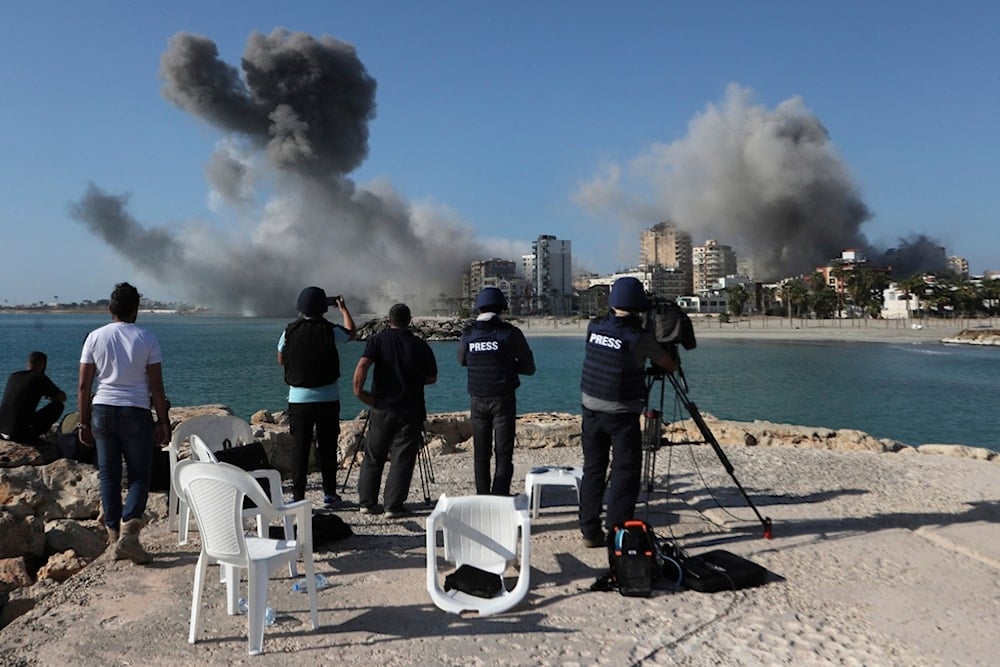Maharat Foundation publishes reports detailing struggles of journalism
The Maharat freedom of expression foundation publishes a report detailing the difficulties of reporting and being a journalist in the midst of war on Lebanon.
-

Journalists film as smoke rises from buildings hit in Israeli airstrikes in Tyre, southern Lebanon, Monday, October 28, 2024 (AP)
The Maharat Foundation, a freedom of expression NGO, has unveiled two new reports detailing the severe impact of the Israeli occupation's war on Lebanon on media freedom and the safety of journalists, in recognition of the International Day to End Impunity for Crimes against Journalists on November 2.
These reports provide an in-depth examination of the threats facing journalists in Lebanon since the outbreak of the Israeli aggression on October 8, 2023, and call for international action to protect journalists.
The first report, titled "A War Without Red Lines: Threats and Risks Facing Journalists in Lebanon," documents the dangers journalists encounter daily, revealing how they have been directly targeted by Israeli attacks despite being visibly marked as press.
The report emphasizes the disregard for international standards protecting journalists, detailing accounts of these assaults and the chilling impact on press freedom and the public's right to information. It calls for the international community to address these attacks by implementing legal measures that safeguard journalists and uphold their essential role in reporting the truth.
Roula Mikhael, Executive Director of Maharat Foundation, underscored the urgent need for global intervention, stating, "In the absence of adequate protection measures, Lebanese journalists remain at risk while performing their professional duties. The ongoing targeting of journalists demonstrates the urgent need for international action to provide them with the necessary conditions to work safely."
"The journalism profession is not just a right; its protection is an obligation for all states, which must ensure that journalists covering wars are protected from attacks so they can continue to convey the truth," she added.
The second report, "Challenges in Media Coverage of the Israeli War on Lebanon," explores the broader media landscape and the complexities of reporting within the war. It highlights how media has become a strategic battlefield for psychological warfare, with both sides vying to control narratives and leverage propaganda.
This report underscores the difficulties journalists face in balancing accurate reporting with the constraints of a war zone and the pressures of countering media manipulation. It also notes Lebanon's lack of an effective state media body to address Israeli propaganda, leaving Lebanese journalists more vulnerable to misinformation and interference.
Through these reports, the Maharat Foundation seeks to draw attention to the critical challenges confronting media and to advocate for strengthened protections for journalists.
The foundation underlined that it hopes these findings would drive efforts to improve journalists' safety and promote media freedom under the exceptional circumstances of ongoing conflict.
'Israel' deliberately kills journalists
On Friday, Israeli occupation forces carried out an aerial attack on the place of residence of press crews in Hasbayya, southern Lebanon, resulting in several casualties among journalists, cameramen, and technicians.
Israeli assault on press freedom
The Scheerpost on Saturday published an analysis by renowned American journalist and writer Chris Hedges, offering a stark examination of the perilous climate for journalists covering the war on Gaza.
Hedges delves into the contrasting realities faced by foreign reporters in "Israel," who he argues are often steered by military-guided narratives, and Palestinian journalists in Gaza, who sacrifice their lives to tell the unfiltered truth.
The article presents a powerful critique of how foreign media correspondents, largely confined to Israeli-controlled narratives, cover the war from luxury hotels and under strict Israeli military oversight.
Meanwhile, Palestinian journalists face daily, life-threatening conditions to fill the gaps left by the international media's absence in Gaza, Hedges points out.
The piece also highlights broader international complicity, particularly focusing on the role of the United States.
Hedges argues that the US government's silence on press suppression in Gaza implicitly endorses the targeting of journalists, drawing parallels to its history of media control and disinformation in previous wars.
Citing US influence over global narratives, he refers to a recent open letter signed by 70 media and civil society organizations urging "Israel" to permit foreign journalists in Gaza — a request that has been met with silence.

 5 Min Read
5 Min Read








